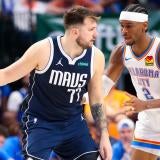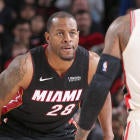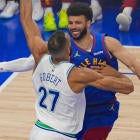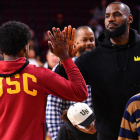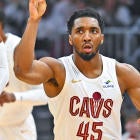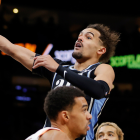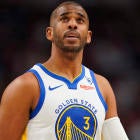Andre Iguodala is the fifth-oldest player to have stepped on an NBA court this season. The 36-year-old just took an eight-month sabbatical so unusual by league standards that his would-be Memphis Grizzlies teammates openly criticized him for it, and it only ended when the Grizzlies were willing to accept $30 million in future salary just to swap him for an oft-injured pale imitation in Justise Winslow. Don't feel bad if you thought Iguodala was washed up. Plenty of others did, too.
It has taken Iguodala all of two games to erase that notion. The immediate numbers on his Miami renaissance are eye-popping. Synergy Sports ranks him in the 99th percentile league-wide defensively as he's allowed only 0.562 points per possession as a primary defender, and the Heat have given up only 88.1 points per 100 possessions with him on the court compared to 116 with him off of it in his two games. Those numbers are laughably unsustainable and the sample here is minuscule. Iguodala has played fewer games in Miami than Mike Piazza.
Still, the game-tape supports the idea that Iguodala remains one of the NBA's very best defenders. He already serves as the primary conductor of Miami's bench defense, a role requiring the sort of blind trust from teammates that few players ever generate. His well-earned reputation precedes him, though. He's managing to generate stops even when his machinations force him to defend two players at once, as was the case on this play in which he directed Chris Silva to serve as strong-side help against a Carmelo Anthony drive.
Plays like that arise out of mistakes elsewhere. The smaller Goran Dragic drew an ill-fated switch onto Anthony, so Iguodala used Silva as insurance knowing that he could close out on Gary Trent Jr. without sacrificing an open dunk to Caleb Swanigan.
Heat coach Erik Spoelstra has ensured Iguodala's freedom to make such plays by empowering him to switch on ball-screens liberally, a tactic famously employed by Golden State. He turned that against them on Monday. Just consider the sequence of events necessary to force a stop on this play:
Iguodala starts this possession on the ball against Jordan Poole. He proceeds to ...
- Help at the basket.
- Recover back to the ball.
- Switch onto Eric Paschall.
- Deny Zach Norvell the exit valve pass to Paschall behind the line.
- Notice that a miscommunication between Dragic and Kelly Olynyk left Novell open quickly enough to challenge his end-of-the-shot-clock 3-pointer.
Plays like this are standard Iguodala fare. He blows up multiple possessions every night by diagnosing the play beforehand and directing the flow of traffic right into his personal black hole.
That IQ is ageless, and Iguodala matches it with some of the most active limbs in basketball. Putting the ball on the floor in his vicinity practically invites turnovers.
Most of these plays work on Iguodala's singular defensive brilliance, a common theme for Miami this season. Bam Adebayo is destined for years of All-Defensive Teams, and Jimmy Butler has already made several, but the Heat defense beyond those two is frightfully underwhelming. After a hot start, it has languished in the middle of the pack for most of the season and was stuck at No. 14 at the time of the the trade. Through a combination of roster constraints and organizational priority, the Heat built their lineups with spacing in mind. The defense suffered as a result. Spoelstra has taken drastic steps to compensate.
Miami leads the league in zone-defense usage this season by a country mile at 13.7 percent, and it should come as little surprise that the runner-up Washington Wizards (7.6 percent) own the NBA's worst defense. Though successful in short bursts, the scheme exists as a crutch for Miami's offensive-minded roster. Patrolling a small area mitigates the damage any single defender can do.
But Iguodala's ability to work in concert with Miami's two other defensive aces creates the potential for both balance and dominance. Even Damian Lillard couldn't find an answer for Iguodala-Adebayo traps.
Put Iguodala and Adebayo together on the floor and defensive functionality is practically assured regardless of which shooters wind up flanking them. Unite the duo with some combination of Butler, fellow-addition Jae Crowder and the perpetually underappreciated Derrick Jones Jr. and the Heat inch closer to defensive nirvana.
No team in the NBA matches that fivesome's switchability. Spoelstra's championship teams blitzed pick-and-rolls relentlessly with LeBron James and Chris Bosh, a strategy this group is athletic enough to mimic. Schematic versatility is priceless in the heavy-game-planning environment of the postseason grinder. The Heat now have it in such spades that they can afford to juggle it.
More than enough length and athleticism exists in that group to swap one out for a Duncan Robinson or Tyler Herro to preserve spacing. Even both could be protected. The Robinson-Herro-Butler-Adebayo foursome has blown teams off of the floor offensively while defending at an above-average rate with players like Meyers Leonard, Kendrick Nunn and Kelly Olynyk. Imagine what sliding Iguodala into that fifth slot might do.
Spoelstra will be creative in the coming months. Circumstances will dictate the balance between offense and defense and how he'll allocate his resources between the two. But Miami's pre-Iguodala playoff hopes rested largely on outscoring the best teams in the NBA with an offense that is currently ranked only No. 8 in the league.
With Iguodala in tow, though, the Heat gain critical optionality. He matchup-proofs a roster that previously placed an enormous burden on its few talented defenders. The Heat have other needs, and Iguodala has notable weaknesses, but the former Finals MVP appears to be exactly what Miami expected through two games.











